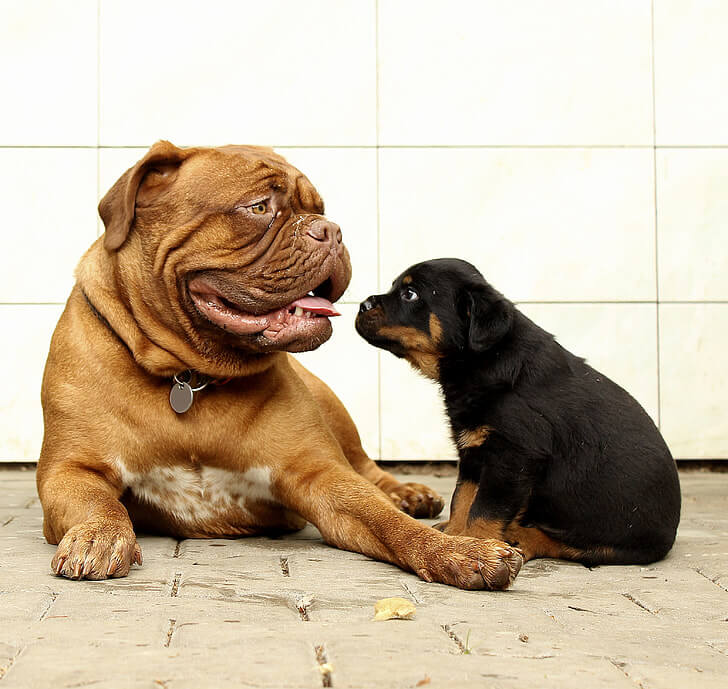Can Adult Dogs Eat Puppy Food
One common question pet owners have regarding dog nutrition is, “Can Adult Dogs Eat Puppy Food?” This question often arises because puppy food assists young dogs’ quick growth and development, which leads many to wonder if it’s also suitable for adult dogs.
Feeding puppy food to adult dogs might seem like a simple solution when your dog needs extra nutrients or if you have leftover puppy food. It is vital to comprehend the ramifications of this decision, nonetheless. Puppy food contains higher protein, fat, and essential nutrients than food formulated for adult dogs. These differences are intentional, catering to the needs of growing puppies.
This question is relevant to ensuring your dog receives the appropriate balance of nutrients for its age and health status. Can Adult Dogs Eat Puppy Food? While it might not be harmful in small amounts, consistently feeding puppy food to adult dogs can lead to potential health issues. This blog article will examine the consequences of feeding puppy food to adult dogs and guide selecting the healthiest food options for your pet.
Understanding Puppy Food

What is Puppy Food?
Puppy food is created specifically to fulfill the distinct nutritional needs of growing dogs. Unlike adult dog food, designed for maintenance and overall health, puppy food supports rapid growth and development during a dog’s early stages. The primary purpose of puppy food is to provide the essential nutrients that puppies need to grow robust muscles, bones, and an immune system.
Nutritional Content of Puppy Food
One key nutritional difference between puppy food and adult dog food is the higher protein and fat content in puppy food. Puppies need more fat and protein to support their fast growth and energy needs. Typically, puppy food contains around 25-30% protein and 15-20% fat, while adult dog food has lower levels to match the less active lifestyle of adult dogs.
Additionally, puppy food is enriched with enhanced amounts of vitamins and minerals, including phosphorus and calcium, essential for developing strong bones. These growth-supporting nutrients ensure that puppies receive the components their bodies require to develop properly. By focusing on these specific nutritional needs, puppy food helps ensure that growing dogs have everything they need for a healthy start in life.
Nutritional Needs of Adult Dogs

What Do Adult Dogs Need?
The dietary requirements of adult dogs differ from those of puppies. Their diet should focus on maintaining overall health rather than supporting rapid growth. A well-balanced diet for adult dogs should include adequate amounts of protein, fat, and carbohydrates, but the levels are generally lower than those required for puppies. Typically, adult dog food contains about 18-25% protein and 8-15% fat, depending on the dog’s activity level and health status.
Differences in Protein, Fat, and Calorie Needs Compared to Puppies
Adult dogs’ protein and fat requirements are lower than those for puppies. Puppies need higher levels of these nutrients to fuel their growth and energy needs, but adult dogs require a balance to maintain a healthy weight and prevent obesity. Similarly, the calorie content in adult dog food is adjusted to match their energy expenditure, which is usually lower than that of growing puppies.
Impact of Puppy Food on Adult Dogs
Feeding puppy food to adult dogs can lead to several issues. The high levels of protein and fat in puppy food can cause weight gain and obesity in adult dogs because they do not require as much energy. This can also lead to other health problems like digestive issues or nutrient imbalances. Potential risks include obesity, pancreatitis, and liver issues, as adult dogs do not need the excess nutrients designed for growth. Therefore, it is important to choose dog food that meets the specific needs of adult dogs to maintain their health and well-being.
Can Adult Dogs Eat Puppy Food?

Short-Term Feeding
Occasional consumption of puppy food by adult dogs is generally safe. If your adult dog eats puppy food occasionally, it’s unlikely to cause significant health issues. The higher protein and fat content might provide a temporary boost in energy. However, short-term feeding should not become a regular habit. While it may be beneficial in certain situations, such as during a transition period or if the dog is underweight, it is not ideal for everyday feeding.
Possible benefits of short-term feeding include increased energy and weight gain if needed. However, the drawbacks include the risk of minor digestive upset or changes in weight if consumed in larger quantities. Monitoring your dog’s health and ensuring that occasional puppy food does not replace a balanced adult diet is important.
Long-Term Feeding
Feeding puppy food to adult dogs on a long-term basis can lead to several risks. Adult dogs are not designed to handle the higher levels of protein and fat found in puppy food. Long-term feeding can cause weight gain and obesity due to the excess calories and fat, which can lead to other health issues.
Potential health issues from long-term puppy food consumption Excessive obesity raises the risk of joint issues and other health concerns. Additionally, nutrient imbalances may occur, as adult dogs do not need the extra vitamins and minerals to grow puppies. Digestive problems might also arise due to the rich and sometimes overly complex nutrient content. Therefore, providing your adult dog with food specifically formulated for their age and health needs is crucial to ensure optimal well-being.
Special Cases Where Puppy Food May Be Appropriate

Health Conditions and Special Needs
In some special cases, a veterinarian might recommend feeding puppy food to adult dogs due to specific health conditions or needs. Puppy food is not typically intended for adult dogs, but there are exceptions where it can be beneficial. For instance, a dog with a high energy requirement due to a health condition or a higher-than-average activity level might benefit from the additional calories and nutrients in puppy food.
Instances Where Puppy Food Might Be Recommended:
- Weight Gain: If an adult dog is underweight or has difficulty gaining weight, a vet may suggest puppy food to help with weight gain due to its higher calorie content.
- Recovery: Following surgery or sickness, dogs may need extra nutrients and energy to aid their recovery; puppy food can provide these additional resources.
- High Activity Levels: Working or highly active dogs may benefit from the higher protein and fat content in puppy food to support their increased energy needs.
Examples of Health Conditions or Life Stages that may require such diets include:
- Puppy-like Growth Issues: Adult dogs with growth issues or nutritional deficiencies may require puppy food’s rich nutrients.
- Pregnancy or Lactation: Female pregnant or nursing puppies might need the extra nutrients in puppy food to support themselves and their puppies.
- Rehabilitation: Dogs undergoing extensive rehabilitation or recovery from serious illness may need the additional calories and nutrients provided by puppy food.
A veterinarian should always be consulted before altering your dog’s diet, especially if you consider puppy food for adult dogs due to specific health conditions or special needs.
Alternatives to Puppy Food for Adult Dogs

High-Quality Adult Dog Food Options
When looking for high-quality adult dog food, it’s essential to choose options specifically formulated to meet the nutritional needs of adult dogs. Good adult dog food recommendations include brands that offer balanced diets with appropriate protein, fat, and other nutrients. Seek for products with actual meat listed as the primary ingredient, and steer clear of those with many fillers or artificial additives.
Key features to look for in adult dog food include:
- Balanced Nutrition: Ensure the food provides a well-rounded mix of protein, fats, carbohydrates, vitamins, and minerals.
- Digestibility: Choose foods with easily digestible ingredients to promote better nutrient absorption and gut health.
- Age and Size Specific Formulas: Select foods tailored to your dog’s age, size, and activity level for optimal health.
Consulting with a Veterinarian
Seeking professional advice is crucial before making significant dietary changes for your dog. A veterinarian can guide the most appropriate diet based on your dog’s health, age, and specific needs. They can help you tailor a diet plan to address your dog’s health concerns or special requirements.
A vet’s input ensures that the food you choose supports your dog’s overall well-being and helps prevent potential nutritional imbalances. By consulting with a vet, you can make informed decisions and choose the best adult dog food for your dog’s unique needs.
Conclusion
Summary of Key Points
Feeding puppy food to adult dogs can be safe in short-term situations but is not recommended as a regular diet. Higher protein and fat content in puppy diets are designed to promote growth, which may not be suitable for adult dogs. Long-term feeding of puppy food can lead to issues such as weight gain, nutrient imbalances, and digestive problems. Consider your dog’s nutritional needs and health conditions before making dietary changes.
Reiterate the importance of choosing the right food for optimal health: Choosing the appropriate food is essential to your dog’s health and well-being. Adult dogs require a balanced diet customized to match their size, age, and degree of exercise to ensure they get the right nutrients without excess.
Final Recommendations
Pet owners should prioritize appropriate dog nutrition by selecting high-quality, age-appropriate dog food. It is imperative to speak with a veterinarian to make informed dietary choices that best support your dog’s health. A vet can provide personalized recommendations and help you address any specific dietary needs or health concerns. Focusing on proper nutrition and professional guidance can help ensure your dog’s long-term health and happiness.
FAQs on Can Adult Dogs Eat Puppy Food
Can Adult Dogs Eat Puppy Food Temporarily?
Answer: It’s not ideal for long-term feeding due to different nutritional needs.
What Takes Place if an Adult Dog Continues to Eat Puppy Food?
Answer: Regular consumption can lead to obesity, nutrient imbalances, and health issues.
How Can I Transition My Adult Dog to a New Food?
Answer: Gradually mix the new food with the current food over a week to avoid digestive upset.
YOU MAY ALSO LIKE:
Complete Guide to How Much Fresh Food to Feed a Dog
How Much Food for 60 lb Dog
How much Cesar Dog Food to Feed
How good is blue buffalo dog food
How Expensive is Farmer’s Dog Food
How Long is Canned Dog Food Good for After Opened
How Long Does a Bag of Dog Food Last
How Much Does Sundays Dog Food Cost
How to choose the best dog food for Huskies
How Much Does Cup of Dog Food Weigh
How to Treat Dog Food Poisoning at Home
How Much is Sunday’s Dog Food?
How Much is Ollie Dog Food in a Month?
How to Choose Dog Food
How Much Pumpkin to Add to Dog Food
How Much Does Farmers Dog Food Cost?
How Long Can Wet Dog Food Sit Out?
How to Soften Dog Food
How to Keep Dogs Out of Cat Food
How to Give Dog Pills Without Food
How to Get my Dog to Eat Dry Food
How to Keep Ants Out of Dog Food
How Much Does Dog Food Cost
How Long to Soak Dog Food
How Much Homemade Dog Food to Feed
How Much Wet Food to Feed a Dog
How to Transition Dog Food
How to Stop Food Aggression in Dogs Towards Other Dogs
How many cups of food should I feed my dog?
How to Stop Food Aggression in Dogs
How Many Cups in a Pound of Dog Food
How Long Does it Take a Dog to Digest Food
Why is My Dog Always Hungry
How Much Protein is in Dog Food?
How to Make Dog Food
how long to feed dog puppy food
What is The Cost to Make Homemade Dog Food?
How to Make Homemade Raw Dog Food
How to Make Homemade Dry Dog Food
How to Prepare Dog Food at Home for Senior Dogs
How to Train a Dog That is Not Food-Motivated
How Much Food Should I Feed
How To Store Dog Food
How Much Time Can a Dog Survive Without Consuming Water
How Long Can a Dog Survive Without Food?

